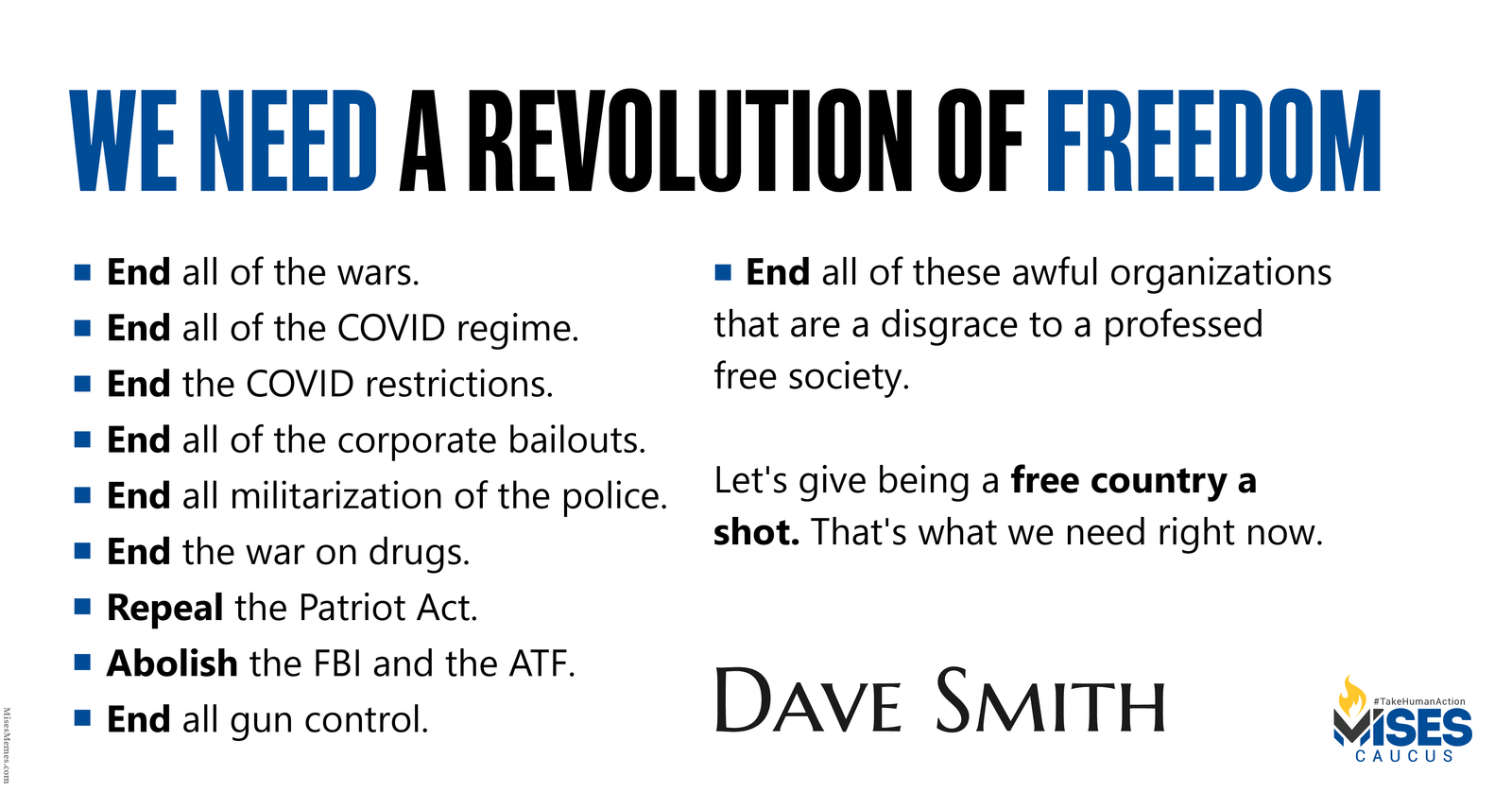The prohibition and control of narcotics have only led to even more detrimental consequences than before the state’s involvement. —Derek Wills


The prohibition and control of narcotics have only led to even more detrimental consequences than before the state’s involvement. —Derek Wills

End all of the wars.
End all of the remnants of the COVID regime.
End the COVID restrictions.
End all of the corporate bailouts.
End all federal militarization of the police.
End the war on drugs.
Repeal the Patriot Act.
Abolish the FBI and the ATF.
End all gun control.
End all of these awful organizations that are a disgrace to a professed free society. Let’s give being a free country a shot. That’s what we need right now. —Dave Smith

I think all those laws against victimless crimes where people are only hurting themselves should be repealed and dealt with in a manner that would actually help people, as opposed to throwing them in jail and taking them away from their families. —Julie Borowski

It is sometimes argued that one of the benefits of legalizing addictive drugs is that they could be taxed, and the government revenues enhanced. From this perspective, this would be the only valid case against legalization. —Walter Block

By the mid-1980s, 72% of new drugs approved by the FDA had already been available elsewhere for an average of 5.5 years. One new drug that came late to the American market was Propranolol, the first beta-blocker to be used extensively to treat angina and hypertension. Approximately 30,000 Americans died prematurely because they couldn’t get this lifesaving drug and because their doctors did not prescribe it. Advertising Propranolol as a treatment was illegal. —Mary Ruwart

If even one new drug of the stature of penicillin or digitalis has been unjustifiably banished to a company’s backshelf because of excessively stringent regulatory requirements, that event will have harmed more people than all the toxicity that has occurred in the history of modern drug development combined. —William Warded

Cancer patients often die waiting for new drugs to be approved by the FDA? Abigail Burroughs had squamous cell carcinoma, diagnosed when she was only 19 years old. She tried unsuccessfully to get FDA permission to try a new drug (Erbitux) that had shown success against her type of cancer. The FDA refused, and Abigail died at age 21. Abigail’s father formed the Abigail Alliance and sued the FDA. However, the courts ruled that Americans do not have the constitutional right to save their lives with drugs not approved by the FDA. —Mary Ruwart

The FDA limits the information that drug companies can share with doctors and consumers. As many as 100,000 Americans died needlessly from heart disease each year that aspirin makers couldn’t advertise aspirin’s role in its prevention. —Dr. Mary J. Ruwart, Healing Our World

We pay 5 times as much for drugs than we should. Because the FDA is blamed when drugs affect some people adversely, the agency drags out the approval process. Drug development time and cost has increased greatly since the early 1960s without any improvement in either efficacy or safety. The true cost, however, is measured in lives, as tens of thousands of people die waiting for the FDA to approve breakthrough drugs. —Dr. Mary J. Ruwart, Healing Our World

The chemotherapy almost killed Thomas. The Navarros refused further treatments, only to find that the FDA wouldn’t permit Thomas to receive the gentler experimental treatment unless he had radiation too. In frustration, the Navarros went to Congress, as other patients have done, to plead for permission to use new drugs not yet approved by the FDA. After a year and a half of fighting, when Thomas was expected to live for only two more weeks, the FDA finally permitted him to have a “compassionate use” exemption.
By that time, Thomas had developed new tumors, called leptomeningial-sarcoma, from his initial chemotherapy. Nevertheless, the experimental treatment kept Thomas going for several more months. How much longer might Thomas have lived if we had honored his parents’ choice in the earlier stages of his disease?
—Dr. Mary J. Ruwart, Healing Our World